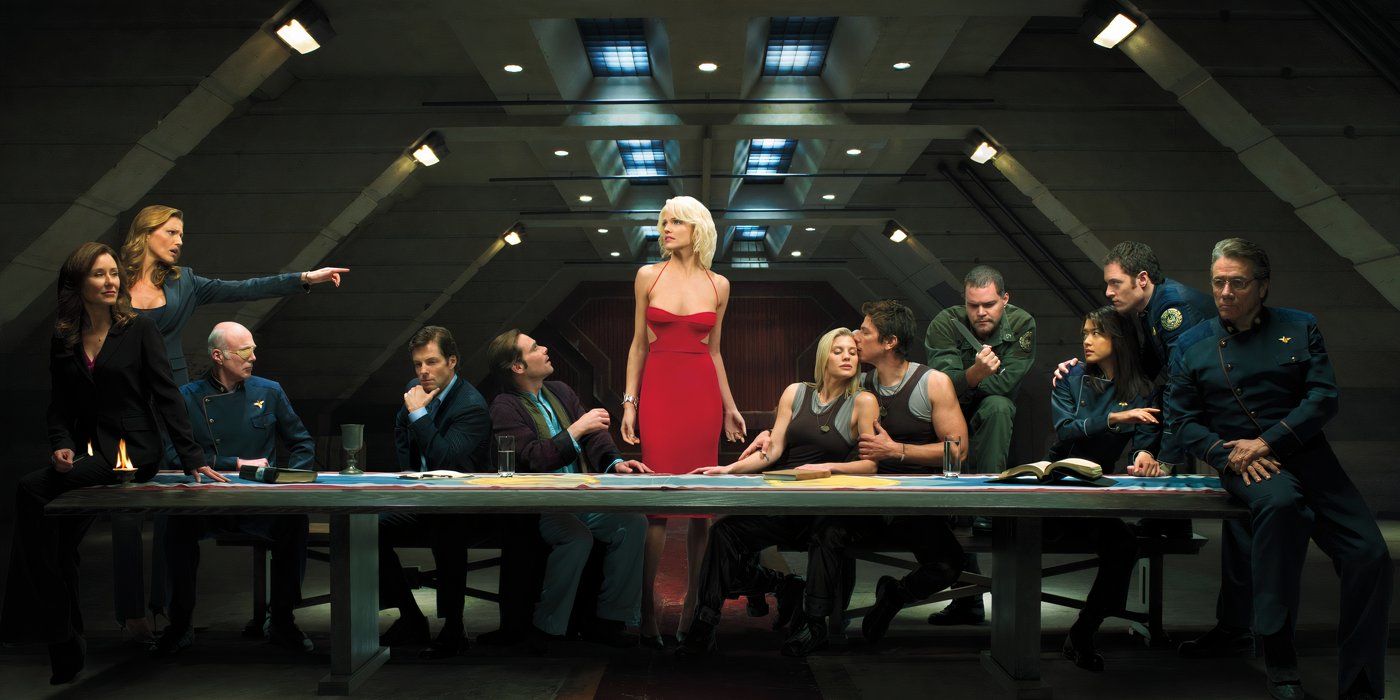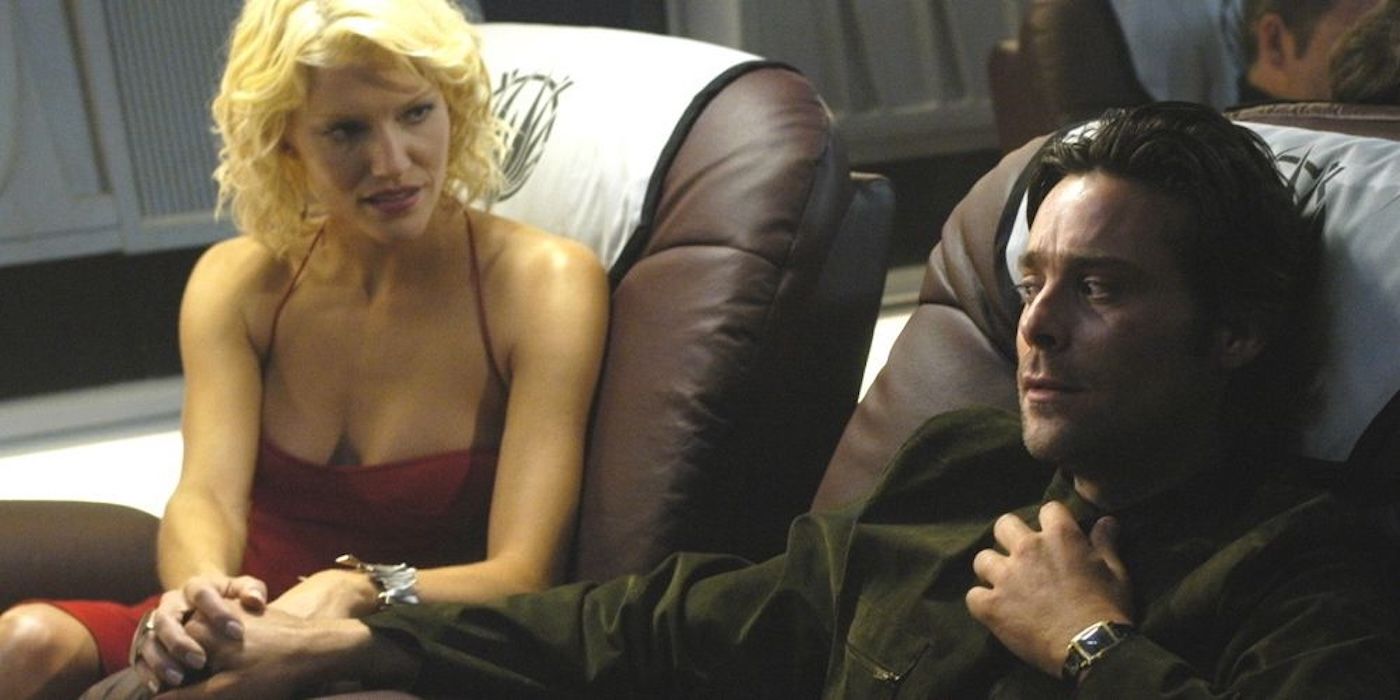
Battlestar Galactica is known for its grounded, human-centered storytelling. Unlike many science fiction series, it avoided the typical trope of introducing extraterrestrial life, a decision was motivated by a combination of creative choices and practical considerations. Showrunner Ronald D. Moore had previously worked on Star Trek and was familiar with the excessive use of futuristic technology and alien encounters in science fiction series, so he decided to create a more grounded and realistic approach. Additionally, Edward James Olmos, who played Admiral Adama, expressed a strong dislike for aliens while working on the show.
The show's focus on human conflict, survival, and moral dilemmas was widely praised, despite Battlestar Galactica having two failed spinoffs; the inclusion of aliens could have potentially diluted these themes. Battlestar Galactica'The Cylons and their plan provided a rich source of conflict without the need for extraterrestrial elements. However, the series' controversial finale complicates this notion. Although Starbuck is heavily implied to be an angel, Head Six and Gaius don't fall so easily into the angelic category – and I think the "higher power" they serve could be an advanced alien entity.
Battlestar Galactica’s “No Aliens” Rule Explained
Olmos claims he would have fainted on camera if aliens appeared
Moore, who wrote the 2000s reboot of Battlestar Galactica, had already worked Star Trek and confessed that "technobabble" from the show "he picked up [...] out of control" (through SlashFilm). In yet another move to make his new show the anti-Star Trek, Battlestar Galactica removed a classic sci-fi ship detail. About that, Olmos expressed a strong personal aversion to the introduction of an alien species into the series. Reports suggest that his contract may have included a clause stipulating his departure from the show if such creatures appeared, while he directly said:
"The first four-eyed monster I see, I'm going to faint on camera - then I'm going to stand up and you're going to write me off the show."
Although Olmos' reasoning remains unclear, his preference for a more grounded, human-centered narrative aligns with Battlestar Galacticaoverall tone, which has always drawn me to the series. The show's exploration of themes such as war, survival, and the human condition earned it critical acclaim and including aliens could have potentially distracted from these powerful stories. I think the existential and moral dilemmas presented by the Cylons – created in the image of humans, but distinct from them – become even more profound without the embellishment of extraterrestrial life.
How Battlestar Galactica's final episode breaks the show's rules about aliens
The nature of the one true God or “him” is unclear in Battlestar Galactica
While Battlestar Galactica Famously avoided aliens in the series, I believe the final episode subtly hinted at the existence of an alien deity. When Caio and Seis argue "God's Plan" Six observations: "He doesn't like that name." Want this non-human "this" Whether it is divine or alien is up to the viewer, but Caio and Seis present themselves as messengers of this higher power. In a post-finale Q&A, Moore stated that they were neither strictly angels nor demons (via SyFy). Instead, they seemed to serve a higher power, guiding, helping, hindering, and tempting the mortal characters.
This final scene underscores the ambiguity of the entire series, and while infuriating, I'm grateful it was left open-ended. They could be angelic beings serving a benevolent deity; they could also be demonic entities with their "tempting" influence. Likewise, the eternal, higher power they work for may be an advanced alien entity that does not fit into an easy moral category and changes into any form that can help. "this" to carry out your big project. The answer remains open-ended, reflecting the complex nature of the characters and the exploration of religious themes, including things Battlestar Galactica's The Last Supper reference.
Battlestar Galactica likely featured aliens from the start
Although the nature of the Cylon God remains ambiguous throughout Battlestar GalacticaThere are hints in the series' mythology suggesting a connection to the ancient Lords of Kobol. Colonial scriptures and certain episodes allude to the possibility that the Cylon God may be a fallen Lord who sought to dominate other deities. For example, in a deleted scene from Season 1, Priestess Elosha describes a war on Kobol that broke out when one of the Lords desired supreme worship, an event that led to the exodus of humanity.
Whether or not viewers believe in a spiritual interpretation depends on how they define the Cylon God's “messengers,” Six and Gaius.
While the term "foreigner" is never explicitly used to describe the Lords of Kobol, their existence and their role in the pantheon of humans suggest that they may be beings from a different world or dimension. This aligns with the show's themes such as creation, destiny, and the nature of existence. While Battlestar Galactica may not have featured traditional physical aliens, the series' mythology means the Cylon God may be an extraterrestrial entity. Whether or not viewers believe in a spiritual interpretation depends on how they define the "messengers" of the Cylon God, Six and Gaius.
